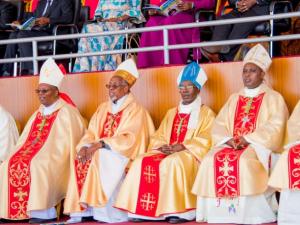
New discussions between Catholic Church and the government to break family planning deadlock
Government of Rwanda and the Catholic Church are in fresh talks to agree on how to move forward with delivering the much-needed services in the area of family planning.
Nearly a week after the Minister for Health, Dr Diane Gashumba, said at a forum in Parliament last month that the Catholic Church was frustrating efforts to scale up family planning, the Minister for Local Government, Prof. Anastase Shyaka, called a meeting with all Catholic Church bishops at his office in Kigali.
Resolutions from that meeting, which was held on June 27, 2019, suggest that talks between the two parties were resumed to agree on how to move forward in delivering health services, including family planning, at Catholic Church-owned medical facilities.
The president of the Episcopal Conference of the Catholic Church in Rwanda, Bishop Philippe Rukamba, confirmed to The New Times on Friday that talks with the government on the matter were revived.
“What is important right now is for people to know that we are in a dialogue and once we are done with the talks, we will come up with a clear agreement,” he said in a telephone interview.
One of the resolutions of the meeting at the Ministry for Local Government was that an agreement between the government and the Catholic Church on the management of hospitals and delivery of health services need to be reviewed as soon as possible to come up with a new agreement.
“In the current agreement we have many provisions, from use of medicines to the management of staff and infrastructure, and in the ongoing talks we will also discuss about the provision of family planning services,” Rukamba said in the interview.
But the same meeting agreed that, for now, health facilities run by the Catholic Church can continue to provide services in the area of family planning, which excludes the provision of artificial birth control contraceptives.
The church, which runs about a third of the country’s hospitals and clinics but with majority of the healthcare providers at the facilities paid by the Government, only allows natural birth control methods on its premises.
That situation means that patients, who need artificial contraceptives such as condoms, implants, or injection, have to go somewhere else.
Speaking at a consultative meeting on family planning at Parliament in Kigali last month, Minister Gashumba said that she was worried about the Catholic Church’s continued attitude towards family planning, indicating that two opposing systems were emerging in the country when it comes to providing healthcare services in that area.
She said that the first approach was using dialogue to educate the Church about the essence of providing all services in family planning, including artificial birth control contraceptives, but it has refused and only allows natural contraception.
Her wish was that a law needs to be applied across the country to ensure that all health facilities provide available family planning services to citizens.
It is that outcry by the health minister that seemingly sparked fresh talks between the government and the church.
Bishop Rukamba said that there was no deadline when the talks would be concluded but emphasized that dialogue is very important because without it people start being confrontational, which isn’t needed.
Rwanda is one of the countries that have made impressive gains in family planning in recent years, cutting fertility rate from 5.8 to 4.2 children per woman between 2000 and 2015.
The country also saw the use of modern contraception methods rise from 4 per cent to 48 per cent during the same period.
But there is still a long way to go considering the fact that Rwanda is one of the most densely populated countries on the continent, which is a threat to national development goals.
By The newtimes
